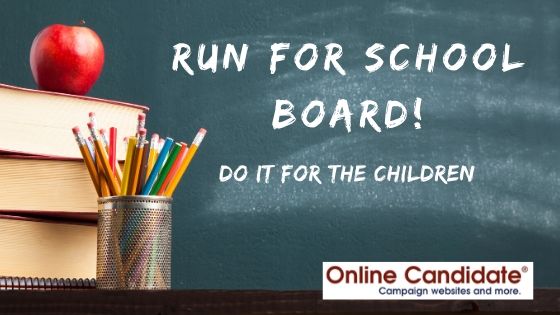In many ways, school boards are heart of our communities. They ensure that all children have access to a quality public education. School board members are elected officials who make decisions and set policies for their district.
These policies include managing budgets, upgrading, and building new schools, and deciding the curriculum that is taught. They also serve as liaisons between their community and the school system. The board works closely with teachers, parents, students, and other community members to ensure that the education system is running as efficiently as possible.
Running for school board is a bit of different than running for other local offices. Campaign spending is generally less, and most campaigning is usually performed only a few weeks before election day.
Year after year, education is ranked as a top voter concern, yet voter turnout rates for school board elections remain low. One reason for low voter turnout is that school board elections often occur on dates that differ from general elections. Some advocates have suggested the idea of combining school board and school budget elections with other local and state election dates that have a higher turnout rate.

Who makes a good school board member?
Running for a school board position is a significant responsibility. School board members have a hand in setting the district’s budget, academic goals, and educational policies. You don’t have to be a parent to run for office. In fact, many school boards across the nation are comprised of non-parents who represent those who send their children to independent schools or whose children are already grown.
Because of the unique situation of these elections, the winner is often the person who can get more people to the polls. The best way to win a school board position is to motivate your supporters.
Candidates should be passionate about their community and education. They need to be able to work with others and bridge conflicts. They should seek out the best interests of the students and the community as a whole.
Becoming a school board member can seem difficult at first, but there are several steps necessary to get started.
Learn the basics about your district
Find out when the next school board election will be held. You’ll need to know the filing dates for candidacy and other requirements to get on the ballot.
Get informed. Do some research about your district. Find out how many schools are in the district, the number of total students and employees, as well as the size of the budget and its recent growth. Attend public meetings to see firsthand how the school board conducts itself.
Fact: According to the National Center for Education Statistics, in the fall 2020, about 48.1 million students attended public schools from kindergarten to grade 12.
What topics concern voters? Parents, friends, and relatives can also help you determine the most important issues facing the district. How are those issues being addressed by the current board? What position do you take on those issues? Are they the same or different? What solutions would you propose as part of your campaign strategy?
Do some research on your current school board. Find out how long each member has served, when they are up for reelection, and do some research into their last election. Who supports them? How much money did they raise and spend? What issues did they run on, and what are their current positions on those issues?
Create a clear platform and campaign message
The most important thing is to have a clear platform and message. That way, people will know what you stand for, and they will identify with your campaign. Be sure to keep your messaging consistent throughout the campaign.
What skills do you have that are valuable to the position? Your strengths may include finance management skills, a dedication to public service, or even a history of activism on behalf of children and families.
Research relevant education-related issues. The issues that are faced by your district and the solutions that you propose will form the foundation of your platform. From there, work on refining your messaging and breaking it down further into more specific components – right down to an ‘elevator speech’ you can use when speaking with others.
For example: “I want to be a school board member because I am passionate about education and the future of our children. I believe that there is a huge disconnect between the school and the community, and I would like to work with both groups to bring people together.”
The importance of fundraising
A key component to winning a school board election is fundraising. It is important that you have enough money for sign printing and other campaign materials. For a lot of candidates breaking into politics, fundraising can be an intimidating process. It’s often hard to know how much money they’ll need to raise, or even where they should spend it.
Build a strong base of grassroots donors who will be your most reliable and loyal supporters. These donors include your family and friends, but also colleagues and other community members. These are the people that you can rely on for contributions, right up to election day.
Besides having a campaign website, you’ll want to use social media. Most candidates for school board start with platforms like Facebook, Instagram, and Twitter. Social media lets directly reach people who might not know about your platform and plans for the school district.
Outside groups can also help you raise money, recruit volunteers, and spread your message. The most common types of outside organizations are Political Action Committees (PACs) and SuperPACs (a type of independent political committee). PACs are also referred to as “connected committees.” These organizations can solicit unlimited donations from people who agree with their cause, and they can use the funds to directly support candidates. They cannot give money directly to candidates, but they can help sponsor events or buy ads on behalf of a candidate.
While having a boost from outside organizations can be valuable, that support can cause controversy. Some voters may view PACs as a way for wealthy special interest groups to influence their local politics and school board decisions. Consider your fundraising sources from these organizations carefully.
Finally, many candidates hold fundraising events. These include more traditional activities such as dinners, concerts, auctions, and rallies. Public events let you engage with your community. But some types of events, especially those that involve food and entertainment, can become expensive to put together. Candidates should first consider the costs and benefits before hosting a fundraising event.
Tips and ideas for school board campaigns
- A school board’s primary mission is to establish local policy and to monitor and evaluate progress within the school district. Know the issues of your district. Attend school board meetings and begin participating as a parent or interested taxpayer.
- Put together a plan for your campaign. Determine the number of voters and calculate the percentage of votes you need to win. Study previous campaigns and learn what previous candidates did right (or wrong).
- Choose a good campaign slogan. Here are some examples that focus on education and students.
- Use both offline and online outreach channels. Typical online channels include email and social media platforms like Facebook and Twitter.
- Turn out the vote. If your election date is off-season, getting out the vote (GOTV) is especially important. You need to work hard to get voters to the polls. Speak with as many parents as you can and encourage them to vote. Keep reminding supporters through email, social media, and phone banks up and through election day.
Get your message out with a campaign website
A school board candidate website provides a great way to publicly state your platform, inform your supporters of the issues, and as a tool to help get them to the polls. We’ve helped many school board candidates and school board president candidates win their elections. With a choice of four affordable website options, political campaigns of all sizes can build a great online presence to reach voters and build support.
- Our Monthly Website Option includes school board template options and is designed for political campaigns starting with a tight budget and do not want to go with one of our extended website packages. The Monthly Option features recurring billing that can be cancelled at any time.
Online Candidate provides the hosting, design, and tools necessary to build a winning online presence. Our platform is designed to help your raise money, recruit supporters, and spread the word.

See our school board website design examples.
Need campaign print materials?
Looking for campaign brochure templates for your school board election? Creating a well-designed political brochure can require top publishing and graphic software. Add in the cost of hiring a professional designer, and a school board election campaign can quickly eat up its budget.
For those without access to Quark and InDesign can still design and self-publish attractive campaign materials. Professionally designed Word brochure templates and school board election flyers are a great way to create consistent-looking materials that will distinguish your campaign from the competition.
Related: Political Canva Templates
Conclusion
Anyone with the initiative to run and win their seat can become a board member for a local school district. You don’t need to have special credentials; you just must step up, win your seats and be sworn in as a new board member.

Check out our school board website packages and resources. They provide an affordable way to start your school board campaign.
Related:
« Tips For Great Political Campaign PhotosBook Review: The Candidate’s 7 Deadly Sins »
Tags: local campaigns, school board





